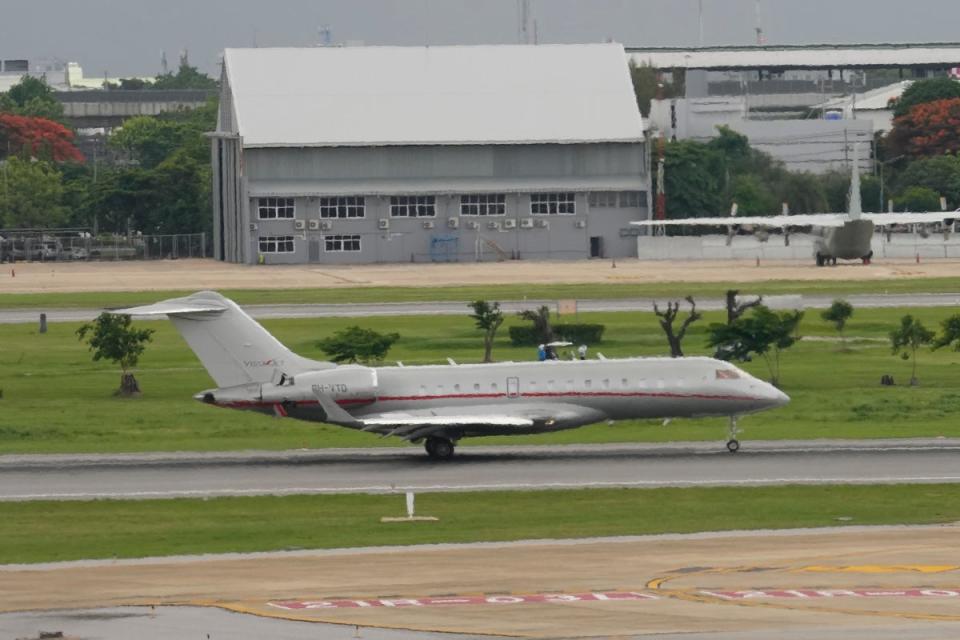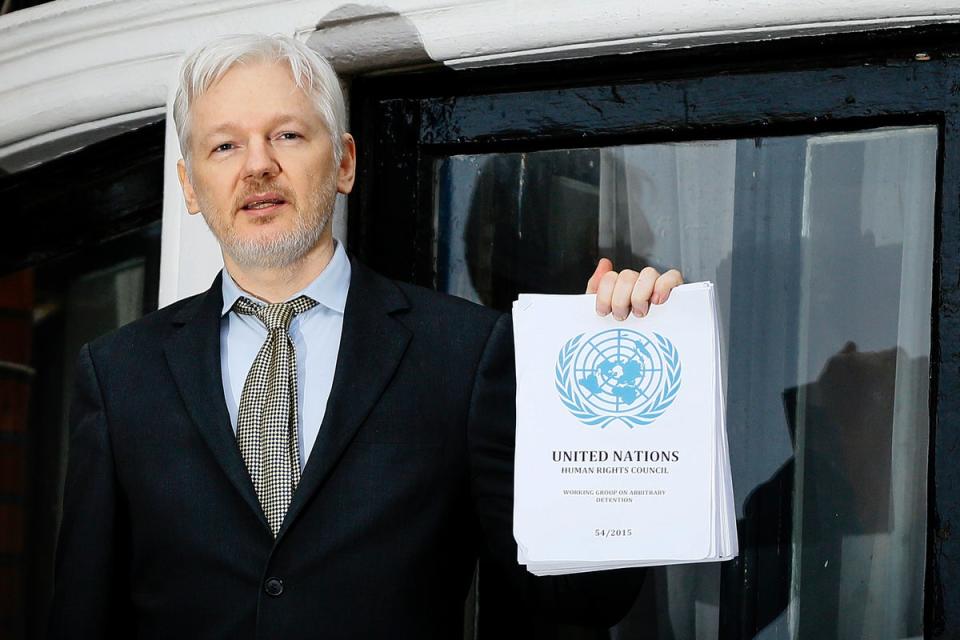Julian Assange left the UK after agreeing to a plea deal that would see the US accept the charge against him and release him.
The WikiLeaks founder was granted bail by the High Court and was released from Belmarsh Prison on Monday following talks with US authorities.
Court documents filed by the U.S. Department of Justice show that Assange is scheduled to appear in federal court to plead guilty to a charge of conspiring to unlawfully obtain and disseminate classified national defense information under the Espionage Act.
It follows the release of hundreds of thousands of leaked documents related to the Afghanistan and Iraq wars.
He will return to his native Australia after his plea and sentencing, scheduled for Wednesday morning local time in the Mariana Islands, a US collection in the western Pacific.
A chartered plane carrying Assange left Stansted Airport on Monday and then touched down at Bangkok airport to refuel at noon local time (BST) on Tuesday.
His wife, Stella Assange, told the PA news agency she would pay $500,000 to fly to Australia.
His father, John Shipton, said his freedom lifted a “huge burden” off his family.
A statement published on the official WikiLeaks account X said Assange left the maximum security prison on Monday “after spending 1,901 days there”.
The statement continued: “He was granted bail by the High Court in London and released at Stansted airport in the afternoon, where he boarded a plane to leave England.
“This is the result of a global campaign involving grassroots organisers, press freedom campaigners, legislators and leaders from across the political spectrum, all the way to the United Nations.
“This created space for protracted negotiations with the U.S. Department of Justice and led to a settlement that has not yet been formally finalized.”
In the video sent to X by WikiLeaks, Assange was seen sitting comfortably in jeans and a shirt, discussing text on a piece of paper.
He is then shown walking up the stairs towards a Vista Jet plane.
Speaking on Assange’s release, Australian Prime Minister Anthony Albanese told the country’s parliament on Tuesday: “We want him to be brought to Australia.”
JULIAN ASSANGE FREE
Julian Assange is free. He left Belmarsh maximum security prison on the morning of 24 June after spending 1,901 days there. He was granted bail by the High Court in London and released at Stansted airport in the afternoon.
– WikiLeaks (@wikileaks) June 24, 2024
He said: “I have made it very clear, both as leader of the Labor Party and the opposition, and also as prime minister, that whatever people’s views on Mr Assange’s activities, the case has been going on for a very long time.
“There is nothing to be gained by his continued incarceration and we want him to be brought home to Australia.”
Mr Albanese added that Australian diplomatic forces had “engaged and defended Australia’s interests using all appropriate channels to support a positive outcome”, which he undertook at the start of his term after being elected prime minister in 2022.
He added: “Once these legal proceedings are concluded, which I hope will be very soon, I will report appropriately at that time.”
The WikiLeaks statement also thanked “everyone who stood by us, fought for us, and remained fully committed to the fight for his freedom.”
The statement said: “After more than five years of isolation in a 2×3 meter cell, 23 hours a day, he will soon be reunited with his wife, Stella Assange, and their children, who only knew their father from behind bars.
“WikiLeaks published groundbreaking stories about government corruption and human rights abuses and held the powerful accountable for their actions. As editor-in-chief, Julian paid a heavy price for these principles and the public’s right to information.

“We thank everyone who stood by us, fought for us and remained fully committed to the fight for his freedom when he returned to Australia. Julian’s freedom is our freedom.”
In a separate post about X, Ms Assange said: “Julian is free!!!!
“Words cannot express our immense gratitude to YOU, yes YOU, who took action over the years to make this happen. THANK YOU. Thank you. THANK YOU.”
He later posted a photo of himself speaking to Assange on the phone outside the Sydney Opera House.
“Julian was calling Sydney from Stansted airport last night (during the day),” he wrote.
Assange’s mother, Christine Assange, told Australia’s Sky News that she was “grateful” that her son’s ordeal was “finally over”.
He said: “This shows the importance and power of quiet diplomacy. Many used my son’s situation to push their own agendas, so I am grateful to those unseen, hard-working people who put Julian’s well-being first.
“The past 14 years have taken a toll on me as a mother, so I want to thank you in advance for respecting my privacy.”
Former British Ambassador to Uzbekistan, Craig Murray, said in a statement to Sky News that Assange’s family was “happy” to be released: “It was very tiring. It’s no secret to be in a maximum security prison for so many years.”
“Why is a journalist who has never harmed anyone in his life being locked up in a prison housing the worst terrorists in the UK… it is hard for anyone to justify that.”
His father said recent hearings in the UK gave him hope that “the future was turning in his son’s favour” and increased pressure from the Australian government.
She said she hopes her son will spend time “walking on beaches and listening to the birds” over the next few weeks and months.
“I had the impression over the last few hearings that something had changed in the attitude of the court, particularly in the concerns expressed by the judges,” Mr Shipton said.
“I never gave up hope, I never despaired that this day would come. I am absolutely very happy, as if a huge burden has been lifted.”
Assange was embroiled in a long legal battle over his extradition in the UK, which culminated in him breaking into and living at the Ecuadorian Embassy in London in 2012 before being detained in Belmarsh prison.
In a ruling handed down in January 2021, then-district judge Vanessa Baraitser said Assange should not be sent to the US, citing a real and “oppressive” risk of suicide, while ruling against him on all other counts.


Later that year, US authorities won a Supreme Court bid to lift that hurdle, paving the way for Assange’s extradition.
Assange was due to lodge his own appeal at the High Court in London in early July, after recently receiving approval to appeal the original judge’s dismissal of parts of his case.
Assange has been detained at HMP Belmarsh for more than five years and has been waging a long legal battle against extradition to the US.
In a court ruling published on Tuesday, Dame Victoria Sharp and Mr Justice Johnson said Mr Assange left the jurisdiction of England and Wales at 6.36pm on Monday following the signing of a plea agreement on 19 June.
The judges added that “a plea is expected to be entered and accepted on Wednesday, June 26, 2024, after which the United States undertakes to withdraw the extradition request.”
They also said Assange’s lawyers and U.S. officials must submit an agreed-upon document related to extradition appeal proceedings, which are ongoing by Friday afternoon.
The Crown Prosecution Service said a bail hearing for Assange was held privately last Thursday.
Stephen Parkinson, director of public prosecutions, said: “Thirteen-and-a-half years and two extradition requests since his initial arrest, Julian Assange left the UK yesterday following a private bail hearing at his own request last Thursday.
“I am proud of the way our extradition unit handled this case. They acted with expertise and skill under international scrutiny to provide legal advice to both Swedish and US authorities.
“This case has consumed significant time and resources from the criminal justice system over many years. The intended outcome of the plea agreement will be to achieve the fundamental goal of ensuring justice. “This will also save the significant expenditure of resources required to further litigate this matter in the UK.”
John Sheehan, CPS extradition officer, said: “This is a highly complex matter involving advising and representing Swedish and US authorities. During this period, the CPS extradition unit encountered and dealt with new and challenging legal problems. Mr. Assange also enjoyed all legal protections available to him.
“This has resulted in the necessary arrangements being facilitated to enable Mr Assange to leave the UK lawfully and safely.”